
|
The world of non-commercial film and A-V |
Events Diary | Search | ||
| The Film and Video Institute | | ||||
The making of Secrets
To BIAFF 2009 results | To Full Making Of Index
During 2008 Phil Martin's In the National Interest took a BIAFF 5-star, a Guernsey Lily, Overall Best Picture at the Cotswolds, Surrey's Fiction Award, Art Direction at Strasbourg, Best Scenario in Canada, a 2nd prize at Tallinn, selection at festivals around the world and ultimately a Gold Medal at UNICA. |
 |
|
All the while, he was working just as intently on another film with two of the same actors. When it came to BIAFF 2009 the new work received 3-stars, a very good mark for most of us, but a surprise in this case. We asked him what went wrong. He was reluctant to say much and determined not to be self-pitying about a competition result. His regrets were that he had not touched the audience as he hoped. Finally he gave in to our pressure to share his reflections on Secrets. |
||
WHAT ON EARTH WAS THAT ALL ABOUT?
I entered two films into BIAFF in 2009. The first was a local history film about a well in a small Oxfordshire village that had been constructed in 1864 as a gift from a Maharajah. The second concerned a businessman who had been caught fiddling his fare on the railways.
In both films I tried to tell a human story because I think that's what film does best. I enjoy a good laugh or a thriller in which the hero survives a series of setbacks before finally triumphing over the villain and winning the girl. But, for me, films are at their best when they speak about the human condition. For example, among 2008's BIAFF 4-star winners, To the Gods by Michael Gough went far beyond a South American travelogue to explore the extent to which pagan religions had been incorporated into Catholicism. Suzy Sommer's Access Prohibited not only showed us what the Aleutian Islands are like but looked at the harm to the Islanders' way of life that had resulted from designation as a World Heritage site. I have made films about the part played by chance in our lives, boyhood dreams and the relationship between different generations. My film In the National Interest was more about the choice between duty and humanity than it was about the Holocaust. In the film about The Maharajah's Well, I tried to cast a new light on the concept of charity. Here was a well, funded from a distant corner of the British Empire so that the people living in village not 50 miles from the Palace of Westminster should have access to clean drinking water - standing the usual concept of overseas aid on its head.
So what was I trying to say in the second film, Secrets - about fare evasion on the railways?
An unlikable businessman on £100,000 a year has been caught having changed the expiry date of his (first class) season ticket. He starts off arrogantly brushing aside any interrogation. When his bluster doesn't work he turns nasty - demanding to see the supervisor. He changes his tone when he finds out that his interrogator, the ticket inspector, has the power of decision. He insists that the inspector couldn't possibly understand the pressures of his mortgage, the school fees, cars and holidays. "Please don't prosecute me; I'll lose my job and possibly my wife and family", he pleads. As the story unfolds it emerges that he hates his job, is despised by his wife and is a stranger to his daughters. And as he comes unstuffed his authority slowly transfers to the ticket inspector, who starts as a minor functionary and develops into the dominant character, taking on the role of psychoanalyst or, perhaps, priest.
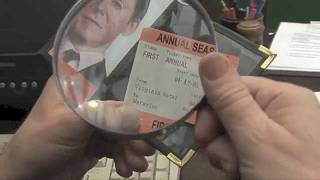 |
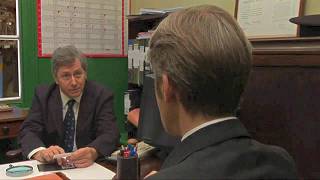 |
It gradually becomes clear that the businessman is faced with a choice between returning to another 25 years of his dysfunctional life or of seizing this chance to go off and start a new life. Either way he is a gutless worm for whom we can have scant respect let alone sympathy.
This is an unpromising moral dilemma from which the audience can take little pleasure. If we were Hollywood we would win audience sympathy by having the businessman turn the situation around in a way that they approve. He would face up to his problems like a man, settle his debt with the railway, resign from his hateful job, go home and win the respect of his wife and daughters and start a new life with them (as a self-sufficient farmer in Cumbria or on a yacht in the South pacific or the like). But that's not how life is. His only realistic choice is either to return to his old life or to abandon his family. In the event he chooses to start a new life abroad but it doesn't much matter which path he chooses.
 |
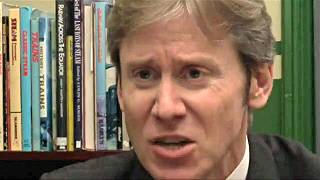 |
So why did I spend 6 months of my life on such unpromising material - scripting, searching out locations, finding actors, making props, begging and borrowing, chauffeuring and editing? What was I trying to say?
I wanted the audience to look beyond the story, to see in it an underlying truth: we are all flawed.
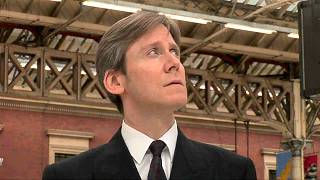 There is nothing special about the businessman or about the
situation in which we see him. He is picked out at random from the teeming
millions and pinned to a light-board like an X-ray in an operating theatre.
We see exposed the psychological equivalent of his spine and ribs, and all
his tiny bones . . . and then he's thrown back into the flow of humanity.
It is rather like looking at a still photograph of a salmon jumping a waterfall.
There's no point in asking "Why that salmon?" out of all the hundreds
of millions or whether the jump succeeded or failed. As with the salmon,
we shall never know what became of him. But we do know that, whatever he
does he can't escape his history. He has chosen to abandon his wife and family
- and that may or may not be for the best - but he carries the fact with
him as a "new secret".
There is nothing special about the businessman or about the
situation in which we see him. He is picked out at random from the teeming
millions and pinned to a light-board like an X-ray in an operating theatre.
We see exposed the psychological equivalent of his spine and ribs, and all
his tiny bones . . . and then he's thrown back into the flow of humanity.
It is rather like looking at a still photograph of a salmon jumping a waterfall.
There's no point in asking "Why that salmon?" out of all the hundreds
of millions or whether the jump succeeded or failed. As with the salmon,
we shall never know what became of him. But we do know that, whatever he
does he can't escape his history. He has chosen to abandon his wife and family
- and that may or may not be for the best - but he carries the fact with
him as a "new secret".
He might as easily have been Ben Johnson or Bernard Madoff, Geoffrey Archer or Jonathan Aitken, Jeremy Thorpe or Max Moseley or a thousand others who have spent their day in the searchlight. The question that this film asks of the audience is "How would you acquit yourself if chance snatched you into the searchlight and revealed your darkest secrets?"
- Phil Martin
Share your passions.
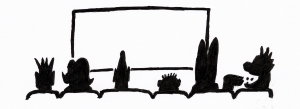
Share your stories.